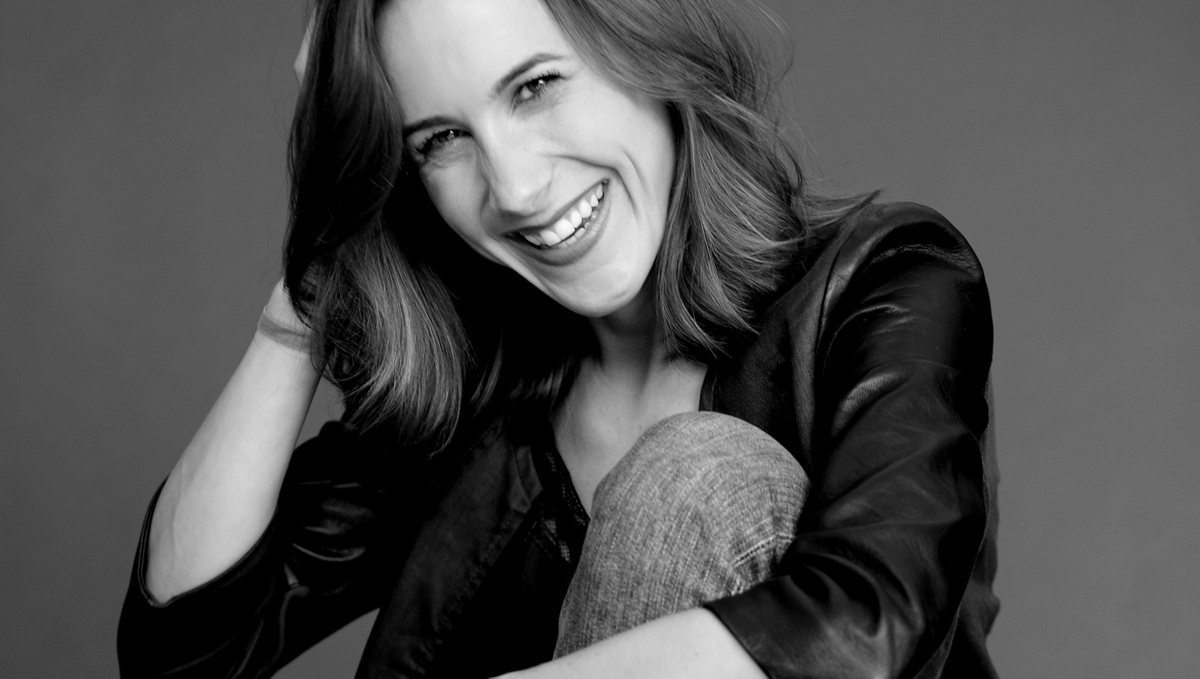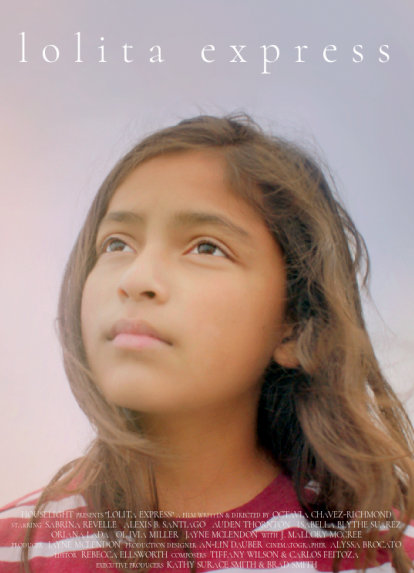
Lolita Express is the second iteration of Capsized. It is a play Octavia wrote and developed at Brown/Trinity Rep.. It is based on several survivors’ accounts of the events surrounding Jeffrey Epstein. Lolita Express follows five teenaged girls and one child of nine as they cope with a life of sex slavery. Although the film centers on an experience of trauma, Lolita Express is full of love. It is about young women finding beauty in horrible circumstances and finding the power and courage to protect each other. Our director puts it best: It is a love letter to survivors.
We were lucky to work with these amazing cast of Alexis B. Santiago, Sabrina Revelle, Auden Thornton, J. Mallory McCree, Isabella Blythe Suarez, Oriana Lada, Olivia Miller and Jayne McLendon.
And a wonderful crew of Octavia Chavez-Richmond (Writer/Director), Alyssa Brocato (DP), An-lin Dauber (Production Designer), and Rebecca Ellsworth (Editor). Also Tiffany Wilson and Carlos Feitoza (Composers). Lolita Express is a production under my company Houselight.
indieactivity: How did you put the crew and cast together?
Jayne McLendon (JM): We brought two of the original actors from Capsized out to LA from New York. They are Oriana Lada and Olivia Miller. We had them involved from the very first reading at Brown. A majority of the cast from the Brown/Trinity community were present. This rooted the entire production experience in trust and friendship. Our Production Designer An-lin Dauber is also a friend and frequent collaborator. Octavia and I felt very strongly about having her on board.
Watch the trailer for Lolita Express produced by Jayne McLendon
Octavia had worked with J Mallory McCree as an actor in the film From Nowhere. He was kind enough to send us a wonderful audition tape. The rest of the cast Octavia and I found through the usual casting process. It was important to us that we found actors passionate about the subject matter. Finding our DP Alyssa Brocato was perhaps the biggest piece of the puzzle. Because of her the rest of the crew fell into place.
What is your experience working on the story, the screenplay, the production?
Jayne McLendon (JM): The script evolved. This evolution ties with the evolution of Houselight as a production company over three years. Lolita Express began with Octavia’s play Capsized, written and developed at Brown/Trinity Rep in Deb Salem Smith’s playwriting class. Octavia’s play is a selection of one of two to receive funded readings in 2017. I loved working on the piece as an actor. Houselight is a theatre company. I put it together prior to graduation from our program. And I approached Octavia to see if she would be interested in collaborating.
After growing as a cohort for three years in the Brown/Trinity actor incubator. My interest in forming a home for graduates of the program and other joyous, like-hearted artists. I had the interest to produce since my time in undergrad at NYU. But I’ve always known that I’d rather help tell someone else’s story than tell my own. I really admire Octavia as a writer and artist, and it seemed an obvious choice to launch the company with the further development of Octavia’s play.

Houselight produced a staged reading of Capsized at Cherry Lane with a cast almost completely made up of Brown/Trinity grads. It was at this time that Octavia began to dream into the world of the play as a short film as we began to discuss how the play’s exploration of memory could deepen on screen. At the time of the first reading none of the actors, myself included, had heard of Jeffrey Epstein. The progression from that first reading to the news of his arrest breaking the night before our first day of filming in Los Angeles created such a heightened level of care and compassion on set.
During the film production, what scene (that made the cut) was the hardest to shoot? And why?
Jayne McLendon (JM): Our biggest challenge throughout the 4 day shoot was the first 30 seconds of the film. This was my first time as a producer working on a project with minors or stunt work. Figuring out how to film a young actor on a moving boat under a SAG contract (on a limited budget) was by far the biggest challenge of pre-production. We were so incredibly lucky to work with an amazing stunt coordinator, Lisa Hoyle, and the very talented actor Isabella Blythe Suarez (Young Nena).
They worked together seamlessly with Alyssa. Unfortunately, our rented speed boat failed to start at 6am and we ended up hiring a tug boat to pull the crew around the harbor. We ended up not getting all the footage we needed, which actually resulted in a restructuring of the film. We began our shoot with the hardest day, but tackling that unexpected challenge right off the bat only heightened our determination.

You must have donned several hats on this film, the measure of your input required intellect, effort, tenacity, skill (…you know better). What did it take you to put out all these qualities to get the film done?
Jayne McLendon (JM): Throughout the four days of filming I juggled wearing producer, actor, transportation, craft services and PA hats. I don’t do well when I have time on my hands, so this was a challenge I thoroughly enjoyed (mostly). I think the biggest thing I learned throughout this experience was how to ask for help. This shoot could not have happened without the incredibly generous time and support of local family and friends. This ranged from my husband picking up and delivering hundreds of tacos, to my mom scrambling to fix my phone that shattered on day two, to one of my childhood best friends jumping in as script supervisor. Our wedding photographer was our set photographer, and my sister (a licensed medical professional) was our set medic.
What about independent filmmaking and the business do you still struggle with?
Jayne McLendon (JM): I’m learning how to recognize when I have to say “no, we don’t have the budget or resources to make that happen” and when I get to say “I have no idea how that’s going to be possible, but I’m going to make it happen.”
Where do you think your strengths lie as a producer?
JM: I hope it’s the mindset that any challenge can be met and every problem has a solution. One of my favorite parts of producing is bringing together people I know and utilizing everyone’s unique talents and skills.

Let’s talk about finance. How did you finance the film?
JM: The film was financed through a Seed & Spark Campaign along with other generous donors, including our executive producers Kathy Surace-Smith and Brad Smith. Lolita Express could not have been made without their support from so early on in the process.
How much did you go over budget? How did you manage it?
JM: Luckily, we didn’t go over budget. We decided early on that going over budget wasn’t an option for us, and it was a great challenge to get incredibly creative with the allocation of funds. We began with the areas we knew could not be negotiated, such as SAG rates and insurance. It was a great asset having An-lin, our Production Designer, on board very early on in the process. I had collaborated with An-lin several times in the past, and together with Octavia we put our heads together to figure out how to stay on budget without sacrificing any part of the story. I think our background in theatre made this a fun collaborative challenge rather than a daunting one.
What do you hope audiences will get from the presentation of your film?
JM: Sex trafficking is incredibly prevalent and affects so many, and yet it can feel like a very distant problem for many. Film has an incredible power to make something distant feel personal, to make a stranger feel like a loved one. Lolita Express is not necessarily a linear film, and I hope it leaves people wanting to know more. I hope it stirs compassion or perhaps even lights a small fire for justice.
What else have you got in the works?
JM: I recently co-wrote and produced a comedy about four 30-somethings navigating life in Toronto. The film is currently in post-production. To be honest, our main goal throughout the whole process has simply been to bring some light, laughter and togetherness into our lives in the midst of a difficult year.
Tell us what you think of the interview with Jayne McLendon. What do you think of it? What ideas did you get? Do you have any suggestions? Or did it help you? Let’s have your comments below and/or on Facebook or Twitter.
Follow Jayne McLendon on Social Media
Website
IMDb
Instagram
Richard Green Documentary, ‘I Know Catherine, The Log Lady’: Premiere in NYC, LA May 9th
Lynchian Doc I Know Catherine, The Log Lady Makes Hollywood Premiere 4/17, Rollout to Follow
In Camera by Naqqash Khlalid Launch on VOD April 29
Naqqash Khlalid’s Directs Nabhan Rizwan. In Camera stars an EE BAFTA Rising Star Award Nominee.
2025 Philip K. Dick Sci-Fi Film Festival Award Winners Announced
Vanessa Ly’s Memories of the Future Awarded Best PKD Feature
Dreaming of You by Jack McCafferty Debuts VOD & DVD for April Release
Freestyle Acquires “Dreaming of You” for April 15th Release
Hello Stranger by Paul Raschid set for London Games Festival & BIFFF
The film Is set for an April 10th Premiere at The Genesis Cinema in London (LGF) and BIFFF
Daydreamers Official Trailer by Timothy Linh Bui: Released by Dark Star Pictures
Daydreamers Vietnamese Vampire Thriller – May 2nd release









